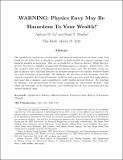| dc.contributor.author | Mueller, Mark | |
| dc.contributor.author | Lo, Andrew W | |
| dc.date.accessioned | 2011-10-17T20:02:09Z | |
| dc.date.available | 2011-10-17T20:02:09Z | |
| dc.date.issued | 2010-04 | |
| dc.date.submitted | 2010-03 | |
| dc.identifier.issn | 1545-9144 | |
| dc.identifier.issn | 1545-9152 | |
| dc.identifier.uri | http://hdl.handle.net/1721.1/66315 | |
| dc.description | Cannot access final published version online | en_US |
| dc.description.abstract | The quantitative aspirations of economists and financial analysts have for many years been
based on the belief that it should be possible to build models of economic systems—and
financial markets in particular—that are as predictive as those in physics. While this perspective has led to a number of important breakthroughs in economics, “physics envy” has
also created a false sense of mathematical precision in some cases. We speculate on the origins
of physics envy, and then describe an alternate perspective of economic behavior based
on a new taxonomy of uncertainty. We illustrate the relevance of this taxonomy with two
concrete examples: the classical harmonic oscillator with some new twists that make physics
look more like economics, and a quantitative equity market-neutral strategy. We conclude
by offering a new interpretation of tail events, proposing an “uncertainty checklist” with
which our taxonomy can be implemented, and considering the role that quants played in the
current financial crisis. | en_US |
| dc.description.sponsorship | AlphaSimplex Group, LLC | en_US |
| dc.description.sponsorship | Massachusetts Institute of Technology. Laboratory for Financial Engineering | en_US |
| dc.language.iso | en_US | |
| dc.publisher | Stallion Press for the Journal of Investment Management | en_US |
| dc.relation.isversionof | https://www.joim.com/abstract.asp?IsArticleArchived=1&ArtID=354 | en_US |
| dc.rights | Creative Commons Attribution-Noncommercial-Share Alike 3.0 | en_US |
| dc.rights.uri | http://creativecommons.org/licenses/by-nc-sa/3.0/ | en_US |
| dc.source | Lo | en_US |
| dc.title | WARNING: Physics Envy May Be Hazardous To Your Wealth | en_US |
| dc.type | Article | en_US |
| dc.identifier.citation | Lo, Andrew W. and Mark T. Mueller. "WARNING: Physics Envy May Be Hazardous To Your Wealth." Journal of Investment Management, 8.2 (2010). | en_US |
| dc.contributor.department | Massachusetts Institute of Technology. Center for Theoretical Physics | en_US |
| dc.contributor.department | Massachusetts Institute of Technology. Laboratory for Nuclear Science | en_US |
| dc.contributor.department | Sloan School of Management | en_US |
| dc.contributor.approver | Lo, Andrew W. | |
| dc.contributor.mitauthor | Lo, Andrew W. | |
| dc.contributor.mitauthor | Mueller, Mark | |
| dc.relation.journal | Journal of Investment Management | en_US |
| dc.eprint.version | Author's final manuscript | en_US |
| dc.type.uri | http://purl.org/eprint/type/JournalArticle | en_US |
| eprint.status | http://purl.org/eprint/status/PeerReviewed | en_US |
| dspace.orderedauthors | Lo, Andrew W.; Mueller, Mark T. | |
| dc.identifier.orcid | https://orcid.org/0000-0003-0245-3364 | |
| dc.identifier.orcid | https://orcid.org/0000-0003-2944-7773 | |
| mit.license | OPEN_ACCESS_POLICY | en_US |
| mit.metadata.status | Complete | |
